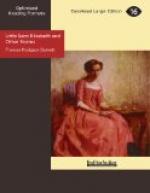Suddenly he began to giggle, and to hug his knees up tight.
“Do you wish to know what I’m laughing at?” he asked Fairyfoot.
“Yes,” Fairyfoot answered.
The little man giggled more than ever.
“I’m thinking about my wife,” he said—“the one I had when I was a robin. A nice rage she’ll be in when I don’t come home to-night! She’ll have to hustle around and pick up worms for herself, and for the children too, and it serves her right. She had a temper that would embitter the life of a crow, much more a simple robin. I wore myself to skin and bone taking care of her and her brood, and how I did hate ’em!—bare, squawking things, always with their throats gaping open. They seemed to think a parent’s sole duty was to bring worms for them.”
“It must have been unpleasant,” said Fairyfoot.
“It was more than that,” said the little man; “it used to make my feathers stand on end. There was the nest, too! Fancy being changed into a robin, and being obliged to build a nest at a moment’s notice! I never felt so ridiculous in my life. How was I to know how to build a nest! And the worst of it was the way she went on about it.”
“She!” said Fairyfoot
“Oh, her, you know,” replied the little man, ungrammatically, “my wife. She’d always been a robin, and she knew how to build a nest; she liked to order me about, too—she was one of that kind. But, of course, I wasn’t going to own that I didn’t know anything about nest-building. I could never have done anything with her in the world if I’d let her think she knew as much as I did. So I just put things together in a way of my own, and built a nest that would have made you weep! The bottom fell out of it the first night. It nearly killed me.”
“Did you fall out, too?” inquired Fairyfoot.
“Oh, no,” answered the little man. “I meant that it nearly killed me to think the eggs weren’t in it at the time.”
“What did you do about the nest?” asked Fairyfoot.
The little man winked in the most improper manner.
“Do?” he said. “I got mad, of course, and told her that if she hadn’t interfered, it wouldn’t have happened; said it was exactly like a hen to fly around giving advice and unsettling one’s mind, and then complain if things weren’t right. I told her she might build the nest herself, if she thought she could build a better one. She did it, too!” And he winked again.
“Was it a better one?” asked Fairyfoot.
The little man actually winked a third time. “It may surprise you to hear that it was,” he replied; “but it didn’t surprise me. By-the-by,” he added, with startling suddenness, “what’s your name, and what’s the matter with you?”
“My name is Prince Fairyfoot,” said the boy, “and I have lost my master’s swine.”
“My name,” said the little man, “is Robin Goodfellow, and I’ll find them for you.”
He had a tiny scarlet silk pouch hanging at his girdle, and he put his hand into it and drew forth the smallest golden whistle you ever saw.




